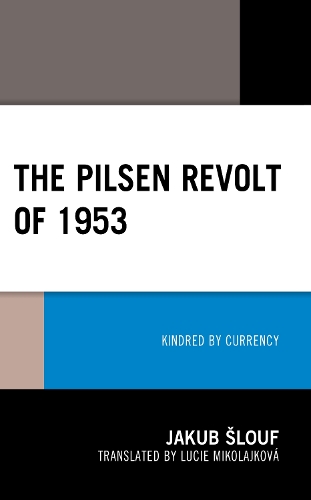
The Pilsen Revolt of 1953: Kindred by Currency
(Hardback)
Publishing Details
The Pilsen Revolt of 1953: Kindred by Currency
By (Author) Jakub louf
Translated by Lucie Mikolajkov
Bloomsbury Publishing PLC
Lexington Books
10th February 2022
United States
Classifications
Professional and Scholarly
Non Fiction
European history
Pressure groups, protest movements and non-violent action
Far-left political ideologies and movements
Left-of-centre democratic ideologies and movements
331.89294371409045
Physical Properties
Hardback
324
Width 160mm, Height 228mm, Spine 25mm
658g
Description
This book analyzes the first of the vast popular uprisings in the countries of Eastern Blocthe revolt of West Bohemian City of Pilsen against the currency reform on June 1, 1953. The text is the first complex critical monograph on this topic. In the methodological field the research is inspired by the theories of so-called new social movements. Therefore, the book frames the Pilsen revolt into the context of previous protest actions that had taken place in the examined region after the establishment of communist dictatorship in Czechoslovakia. Thus, the text deals with all the conflicts occurred within the years 19481953. This method enables the author to study several protest cultures which operated on a long-term base in various parts of the society and whicheach of them in a different wayaffected the course of the Pilsen revolt. So, the work provides not only the detailed critical description of June 1953 events but also their cultural genealogy.
Reviews
This book is a seminal and entirely original study of the Pilsen revolt against the currency reform of June 1953, one of the crucial events from the early days of Communist rule in Czechoslovakia. Thanks to the author's erudite exploration of historical sources--thoroughly backed up by theoretical research--as well as the concise, engaging presentation of his findings, this book surpasses anything published about the subject to this date.
--Michal Kopecek, Institute for Contemporary History of the Czech Academy of SciencesThis study is not merely a detailed reconstruction of the Pilsen riots, thoroughly backed up by historical sources. It is a case study that provides important insights and detailed analyses of the relationship between industrial workers and the socialist dictatorship at the height of the Stalinist era. Slouf's book challenges the prevailing interpretation of events which explains the June protests merely as a spontaneous reaction of Pilsen workers to the currency reform and its immediate impact on their living standard. Slouf postulates, on the other hand, that the Pilsen riots were the final event in a chain of long-term conflicts that plagued Czechoslovak society since the end of the Second World War. It is no exaggeration to say that this book is a seminal milestone in the research of resistance against the socialist dictatorship in Czechoslovakia.
--Vtezslav Sommer, Institute for Contemporary History of the Czech Academy of SciencesAuthor Bio
Jakub louf is a member of the Czech National Archives Editorial Board and editor of the journal Securitas Imperii.
